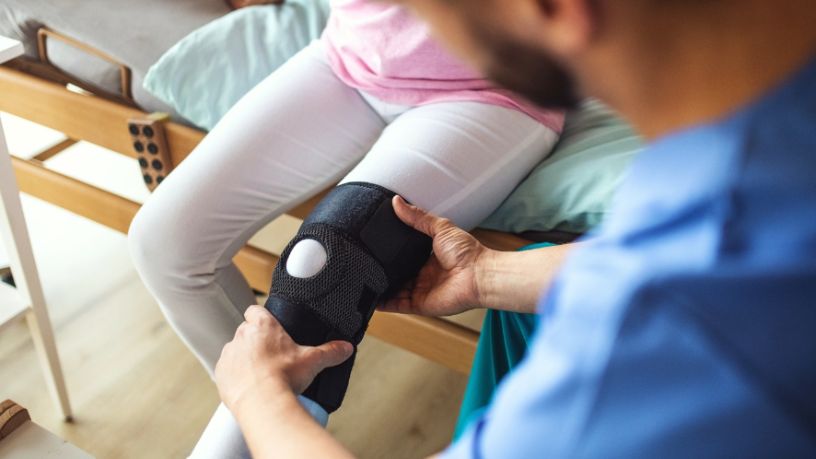Knee surgery can be a serious procedure that requires a lot of physical and mental preparation.
Key takeaways
Going into your surgery with the right advice may help speed up your recovery.
Here are 5 expert tips to make your recovery as smooth and pain-free as possible.
Recovering from knee surgery is no easy feat. So, it pays to go into it with a little know-how. Here are 5 tips to speed up your recovery.
1. Find a good knee surgeon
A good recovery from knee surgery all starts with good-quality knee surgery.
According to Physiotherapist Dave Morarty, it’s important to find a knee surgeon who you feel comfortable with, and who can help prepare you both mentally and physically. It’s also important that this knee specialist works with your physiotherapist.
“You’ve got to have huge confidence in the surgeon and the physio,” says Morarty. “Ideally, they will communicate with each other and you’re free to ask questions.”
2. Start prehab
Before surgery, your knee may be inflamed and sore, not only from injury but also from the collateral damage of day-to-day stresses.
Prehabilitation (aka ‘prehab’) is exercise training that can be done with a physio prior to surgery. It may help strengthen your knee, improve motion and reduce inflammation. Prehab might also help prepare your knee for surgery and let you step into rehab more effectively.1
“Having treatment to settle the inflammation down and regain some strength and range of motion prior to surgery means that when the surgeon goes to operate, it’s a discrete amount of damage the surgeon has to fix, rather than a whole lot of inflammation that’s going to delay your recovery,” says Morarty.
We have had cases where people have been able to cancel surgery after having prehab because their functional levels improved so much that the symptoms went away and function returned.
3. Commit to rehab
Rehabilitation is a vital and sometimes lengthy part of your knee surgery recovery. But putting in the time is worth it.
Morarty says rehab is generally broken into 3 phases:
- settling down and healing
- strengthening and regaining motion
- returning to sport or activities.
“It’s about strength, regaining motion, regaining balance and having that recovery time to allow the injury to heal,” he says.
“With some patients, we find we need to push a bit harder, [while] others we have to restrain and hold back. Everyone is a bit different.”
4. Prepare mentally
When going into surgery, mental preparation can be just as important as physical preparation.
Morarty says a good physio will help you psychologically prepare your surgery and recovery, because “a lot of people haven’t got a mental picture of what it’s going to be like”.
“The surgeon’s appointment is often quick,” he says, “[so patients] know the basics of what’s going to happen in the procedure, but they don’t know how the knee is going to look and what the early days of their mobility are going to be like.”
Post-surgery mental health is an important aspect of recovery. This is where your physio can come in.
“We’re with the patient a lot,” says Morarty. “We might be seeing them initially 3 times a week, so we often have time to deal with their fears and answer a lot more questions.”
For example, Morarty says patients often need to be told they’ll start their rehab exercises before the pain settles completely. Pain relief and, sometimes, anti-inflammatories can play an important role during this stage.
“It’s better to exercise with adequate pain relief than to be unable to exercise because of the pain.”
Remember, surgery is a difficult process, so it’s okay to put your mental health first and reach out to someone like a doctor or psychologist.
Are you in need of urgent support?
We've put together a list of services for free support that's relevant to where you live, and what you're going through.
5. Speed versus quality
For many people, the question of when they can get back to sport or other activities is at the heart of their recovery. But, Morarty warns, it’s important to not rush things, because pushing too hard too soon is more likely to hinder than help.
“People get very focused on the time they took to get better,” he says. “What we really want overall is to get the best outcome in terms of quality. That means getting back to the best potential you can as soon as possible.”
Resources
Musculoskeletal Health Australia provides information and support for people living with arthritis and musculoskeletal conditions. Visit their website or call them on 1800 263 265.
Pain Australia works towards improving the quality of life for those living with pain. Visit their website for resources and support, including their National Pain Services Directory.
NSW Government Health’s Patient Roadmap is a handy step-by-step guide to preparing for and recovering from surgery.
The Australian Physiotherapy Association can help you find a physio near you.

At Bupa, trust is everything
Our health and wellbeing information is regularly reviewed and maintained by a team of healthcare experts, to ensure its relevancy and accuracy. Everyone's health journey is unique and health outcomes vary from person to person.
This content is not a replacement for personalised and specific medical, healthcare, or other professional advice. If you have concerns about your health, see your doctor or other health professional.
1 Moyer, R., Ikert, K., Long, K., & Marsh, J. (2017). The Value of Preoperative Exercise and Education for Patients Undergoing Total Hip and Knee Arthroplasty: A Systematic Review and Meta-Analysis. JBJS reviews, 5(12), e2.
You might also like...
5 best exercises to strengthen your knee after surgery
If you’ve had knee surgery, support your recovery with these 5 physiotherapist-approved exercises. Regain strength and mobility safely at home.
What you need to know about knee replacement surgery
A knee replacement or revision can improve your mobility and quality of life, but it’s still a major surgery. So, what do you need to know about your knees?
7 things I wish I knew before a hip replacement
A hip replacement is a major life decision that can significantly improve your quality of life. Here are some things you should know before having surgery.
What you need to know before knee reconstruction surgery
Find out everything you need to know about knee reconstruction surgery and how to set yourself up for your best possible recovery.





